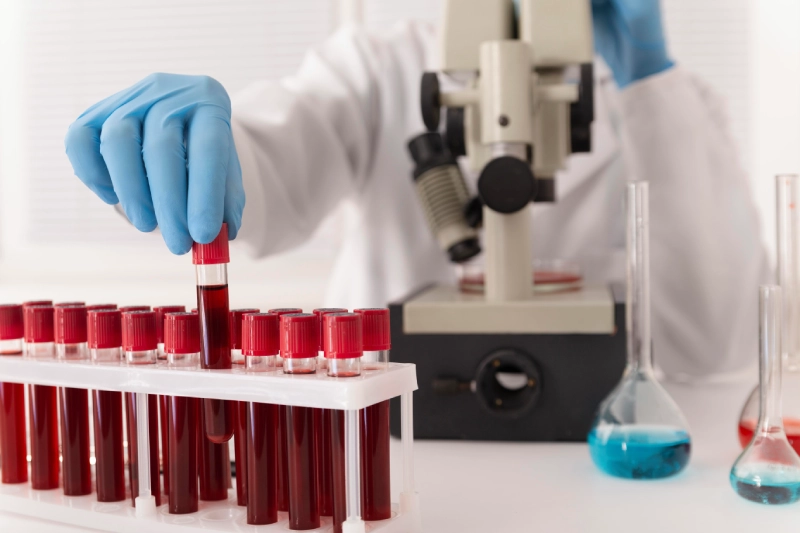
Haematology
Hematology (or haematology) is the branch of medicine that studies blood, blood-forming organs, and blood diseases. It involves diagnosing and treating disorders related to red and white blood cells, platelets, hemoglobin, blood vessels, bone marrow, lymph nodes, spleen, and the proteins involved in blood clotting and bleeding.
Types of Hematological Studies and Tests
Complete Blood Count (CBC): Measures red and white blood cells, hemoglobin, hematocrit, and platelets.
Peripheral Blood Smear: Examines blood cell morphology under a microscope to detect abnormalities.
Bone Marrow Examination: Assesses bone marrow for abnormalities, essential for diagnosing leukemia, anemia, and other marrow disorders.
Coagulation Tests (e.g., PT, aPTT): Checks clotting function to diagnose bleeding disorders like hemophilia or monitor anticoagulant therapy.
Flow Cytometry: Identifies and counts blood cells, primarily for diagnosing blood cancers.
Genetic Tests: Identifies mutations linked to blood disorders like sickle cell anemia or thalassemia.
Immunohematology Tests: Involves blood typing and cross-matching for transfusions.
Iron Studies and Ferritin Levels: Evaluates iron levels to diagnose types of anemia.
Clinical Significance
Diagnosis of Blood Disorders: Hematology tests are fundamental for diagnosing conditions such as anemia, leukemias, lymphomas, and clotting disorders.
Guidance for Treatment: Results from blood tests guide the use of therapies like chemotherapy, anticoagulation therapy, and iron supplementation.
Monitoring Disease Progression: Regular hematological testing allows for monitoring disease status in chronic conditions like leukemia or myeloma.
Preoperative Assessments: Ensures safe surgical planning by evaluating coagulation status to reduce the risk of bleeding complications.
Screening for Genetic Disorders: Allows for early intervention in inherited conditions like sickle cell anemia or hemophilia.
Limitations of Hematological Tests
Sample Quality Issues: Hemolysis (rupturing of blood cells), clotting, or improper storage can alter results, leading to inaccurate diagnosis.
Non-Specific Findings: Many blood abnormalities (e.g., low hemoglobin or high white cell counts) are non-specific and may require further testing to pinpoint the exact cause.
Variability in Results: Factors like recent infections, medications, or even stress can impact test results, which might not reflect a true disease state.
Time Sensitivity: Some hematology tests require quick analysis, such as coagulation tests, and delays can compromise accuracy.
Invasiveness of Bone Marrow Examination: Bone marrow biopsies, though necessary for certain diagnoses, can be invasive and uncomfortable, limiting their use for regular monitoring.
Cost and Accessibility: Advanced tests like flow cytometry or genetic testing can be expensive and are not universally available, limiting access for some patients.
Despite these limitations, hematological studies and diagnostics are essential for understanding and treating a wide range of health issues. Advances in technology, such as automated blood analyzers and molecular diagnostics, continue to improve their accuracy and applicability in clinical practice.
